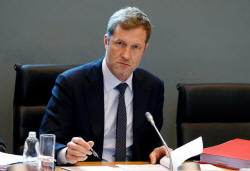|
EU, Canada press Belgian
region to accept free trade deal
 Send a link to a friend
Send a link to a friend
 [October 21, 2016]
By Philip Blenkinsop [October 21, 2016]
By Philip Blenkinsop
BRUSSELS
(Reuters) - Canada's trade minister and a European Union negotiator held
urgent talks with the premier of the Belgian region of Wallonia on
Friday to try and break a deadlock preventing EU nations signing an EU-Canadian
free trade deal.
All 28 EU governments support the Comprehensive Economic and Trade
Agreement (CETA), but Belgium cannot give assent without backing from
five sub-federal administrations, and French-speaking Wallonia has
steadfastly opposed it.
The region rejected amendments put forward on Thursday.
Wallonia Premier Paul Magnette told a news conference that the
concessions had been a step forward, but not enough to answer concerns
over agricultural exports and an independent court system that critics
say can be exploited by big business to dictate public policy.
Magnette was due to address the Walloon parliament on Friday morning,
but the session was delayed as the talks continued.
Failure to strike a deal with such a like-minded country as Canada would
call into question the EU's ability to forge other deals and undermine a
bloc already battered by Britain's vote to leave and disputes over the
migration crisis.

The moves came as leaders held a two-day EU summit in Brussels with
trade policy the main topic set for Friday. European Council President
Donald Tusk, chairing the summit, said that Europe's credibility was at
stake.
Wallonia is home to about 3.5 million people, less than 1 percent of the
507 million Europeans CETA would affect, but the EU's flagship trade
project is resting on the will of its government.
CETA was set to be signed at an EU-Canada summit next Thursday in the
presence of Canadian Prime Minister Justin Trudeau.
Tusk said the issue was greater than just a trade deal with Canada, the
EU's 12th largest trading partner. If CETA fails, the EU's hopes of
completing similar deals with the United States or Japan and opening up
new talks with partners such as Australia and New Zealand would be in
tatters.
Belgian Prime Minister Charles Michel, whose centre-right coalition
supports CETA, said he had spoken to Trudeau by phone.
"I feel the situation is also becoming more difficult in Canada. There
has been a radicalisation of the position after the decision yesterday
of the Walloon government. But at the moment there is a dialogue," he
told reporters on arrival for the EU summit.
[to top of second column] |

Minister-President of Wallonia Paul Magnette attends a meeting on
the Comprehensive Economic and Trade Agreement (CETA), a planned EU-Canada
free trade agreement, at the Walloon regional parliament in Namur,
Belgium, October 21, 2016. REUTERS/Francois Lenoir

Michel and European Commission president Jean-Claude Juncker briefed EU
leaders on the efforts to seal CETA with discussions due to focus on
ways to protect the bloc from what the EU says is dumping, notably of
steel from China.
"It's all under the shadow of CETA," an EU official said
Michel said he was aware of how serious the situation was.
"I hope in the coming hours that there will be a positive solution, but
I am not completely reassured to be honest with you," he said.
Walloon's lawmakers share concerns voiced by many on the European left
that CETA, and a stalled plan for a similar deal with the United States,
risk watering down consumer, labor and environmental protections and
granting power to multinationals.
(Additional reporting by Alissa De Carbonnel and Alastair Macdonald;
Editing by Andrew Heavens)
[© 2016 Thomson Reuters. All rights
reserved.] Copyright 2016 Reuters. All rights reserved. This material may not be published,
broadcast, rewritten or redistributed.

 |